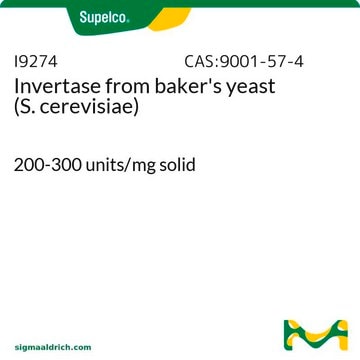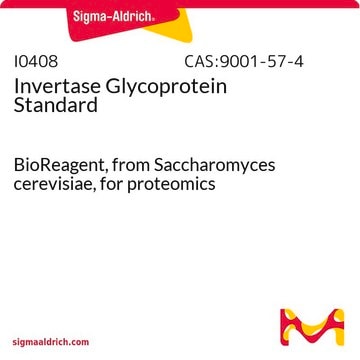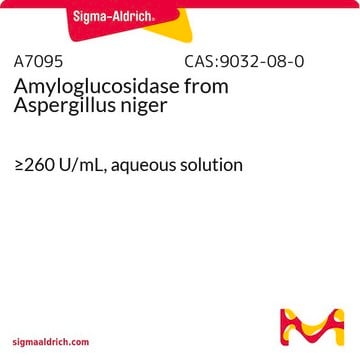I4753
Invertase from Candida utilis
Grade X, ≥300 units/mg solid
Sinónimos:
β-D-Fructofuranoside fructohydrolase, β-Fructofuranosidase, Saccharase
Iniciar sesiónpara Ver la Fijación de precios por contrato y de la organización
About This Item
Productos recomendados
tpo
Grade X
Nivel de calidad
Formulario
solid
actividad específica
≥300 units/mg solid
mol peso
~260 kDa
actividad extraña
α-galactosidase (melibiase), essentially free
temp. de almacenamiento
−20°C
Descripción general
Invertase from Candida utilis is secreted in the periplasm. The molecular weight of invertase from C. utilis is 300 kDa. It is a dimer of identical subunits. It is a N-glycosylated protein, rich in mannose oligosaccharide in its structure. The invertase encoding gene of C. utilis shares high homology with SUC2 gene of Saccharomyces cerevisiae.
Aplicación
Invertase from Candida utilis has been used:
- as a supplement in YE liquid medium to observe for morphological changes in Streptomyces sp.
- to determine the sucrose content in ethanolic extract of leaf tissues
- to determine the total non-structural carbohydrates (TNC) in root tissues
This enzyme is useful for enzymatic determination of saccharose and for the structure investigation of carbohydrates containing β-D-fructofuranoside residue.
Acciones bioquímicas o fisiológicas
Invertase acts on sucrose and cleaves it into glucose and fructose. It is used in the preparation of invert syrup with equimolar concentration of fructose and sucrose. It finds its applications in confectionaries and in the production of alcoholic beverages, glycerol and lactic acid. Invertase is also used in the preparation of artificial honey, plasticizers for cosmetic industries.
Propiedades físicas
Michaelis constant : 1.5x10 -2M (Saccharose)
Structure : Glycoprotein containing ca. 50% of carbohydrates
Optimum pH : 3.5 - 4.0 Optimum temperature : 60 - 70oC
pH Stability : pH 4.0 - 6.0 (50oC, 10min)
Thermal stability : below 60oC (pH 4.5, 10min)
Substrate specificity : The enzyme hydrolyzes saccharose and raffinose, but does not
hydrolyze inulin and melezitose.6)
Structure : Glycoprotein containing ca. 50% of carbohydrates
Optimum pH : 3.5 - 4.0 Optimum temperature : 60 - 70oC
pH Stability : pH 4.0 - 6.0 (50oC, 10min)
Thermal stability : below 60oC (pH 4.5, 10min)
Substrate specificity : The enzyme hydrolyzes saccharose and raffinose, but does not
hydrolyze inulin and melezitose.6)
Definición de unidad
One unit will hydrolyze 1.0 μmole of sucrose to invert sugar per min at pH 4.5 at 55°C.
Nota de preparación
Chromatographically purified
Palabra de señalización
Danger
Frases de peligro
Consejos de prudencia
Clasificaciones de peligro
Resp. Sens. 1
Código de clase de almacenamiento
10 - Combustible liquids
Clase de riesgo para el agua (WGK)
WGK 3
Equipo de protección personal
Eyeshields, Gloves, type N95 (US)
Elija entre una de las versiones más recientes:
¿Ya tiene este producto?
Encuentre la documentación para los productos que ha comprado recientemente en la Biblioteca de documentos.
Los clientes también vieron
Interactive effects of elevated carbon dioxide and growth temperature on photosynthesis in cotton leaves
Reddy AR, et al.
Plant Growth Regulation, 26(1), 33-40 (1998)
Purification and characterization of an invertase from Candida utilis: comparison with natural and recombinant yeast invertases
Chavez FP, et al.
Journal of Biotechnology, 53(1), 67-74 (1997)
Winter foot and equipment traffic impacts on a `L93?creeping bentgrass putting green
Baldwin CM, et al.
Hortscience: a Publication of the American Society For Horticultural Science Hortscience, 43(3), 922-926 (2008)
Invertase and its applications-a brief review
Kulshrestha S, et al.
Journal of Pharmacy Research, 7(9), 792-797 (2013)
Morphological and physiological changes in Streptomyces lividans induced by different yeasts
Santamaria R, et al.
Archives of Microbiology, 177(3), 259-266 (2002)
Protocolos
The appearance of reducing sugars is measured by the modified Fehling-Lehmann-Schoorl method.
Enzymatic Assay of Invertase
Nuestro equipo de científicos tiene experiencia en todas las áreas de investigación: Ciencias de la vida, Ciencia de los materiales, Síntesis química, Cromatografía, Analítica y muchas otras.
Póngase en contacto con el Servicio técnico











